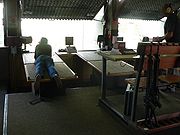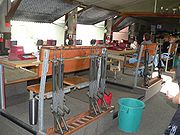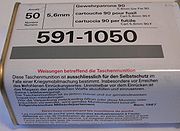
Gun politics in Switzerland
Encyclopedia

Gun politics in Switzerland are unique in Europe. The personal weapon of militia is kept at home as part of the military obligations. Switzerland has one of the highest militia gun ownership rates in the world. In recent times political opposition has expressed a desire for tighter gun regulations. A referendum in February 2011
Swiss referendum, February 2011
A referendum was held in Switzerland on 13 February 2011 on the initiative "For the protection against gun violence" .-Initiative:...
rejected stricter gun control.
Army-issued arms
The Swiss army has long been a militiaMilitia
The term militia is commonly used today to refer to a military force composed of ordinary citizens to provide defense, emergency law enforcement, or paramilitary service, in times of emergency without being paid a regular salary or committed to a fixed term of service. It is a polyseme with...
trained and structured to rapidly respond against foreign aggression. Swiss males grow up expecting to undergo basic military training, usually at age 20 in the Rekrutenschule (German for "recruit school"), the initial boot camp, after which Swiss men remain part of the "militia" in reserve capacity until age 30 (age 34 for officers). Each such individual is required to keep his army-issued personal weapon (the 5.56x45mm Sig 550 rifle for enlisted personnel and/or the 9mm SIG-Sauer P226
SIG P226
The SIG P226 is a full-sized, service-type pistol made by SIG Sauer. It is chambered for the 9×19mm Parabellum, .40 S&W, .357 SIG, and .22 Long Rifle. It is essentially the same basic design of the SIG P220, but developed to use higher capacity, staggered-column magazines in place of the...
semi-automatic pistol for officers, medical and postal personnel) at home with a specified personal retention quantity of government-issued personal ammunition (50 rounds 5.56 mm / 48 rounds 9mm), which is sealed and inspected regularly to ensure that no unauthorized use takes place. The ammunition is intended for use while traveling to the army barracks in case of invasion.
When their period of service has ended, militiamen have the choice of keeping their personal weapon and other selected items of their equipment. In this case of retention, the rifle is sent to the weapons factory where the fully automatic function is removed; the rifle is then returned to the discharged owner. The rifle is then a semi-automatic or self-loading rifle.
The government sponsors training with rifles and shooting in competitions for interested adolescents, both male and female.


Assault rifle
An assault rifle is a selective fire rifle that uses an intermediate cartridge and a detachable magazine. Assault rifles are the standard infantry weapons in most modern armies...
s is subsidized by the Swiss government and made available at the many shooting ranges patronized by both private citizens and members of the militia. There is a regulatory requirement that ammunition sold at ranges must be used there.
The Swiss Army maintains tight adherence to high standards of lawful military conduct. In 2005, for example, when the Swiss prosecuted recruits who had reenacted the torture scenes of Abu Ghraib
Abu Ghraib torture and prisoner abuse
Beginning in 2004, human rights violations in the form of physical, psychological, and sexual abuse, including torture, rape, sodomy, and homicide of prisoners held in the Abu Ghraib prison in Iraq came to public attention...
, one of the charges was improper use of service weapons.
In 2001 Swiss citizen Friedrich Leibacher
Friedrich Leibacher
Friedrich Heinz Leibacher was a Swiss spree killer who killed 14 members of the Zug canton Parliament, injuring 18 others, before committing suicide....
entered a regional Swiss parliament building and used a rifle to kill 14 people before killing himself. Strangely enough, this was not his personal army issue weapon, but a private version of the army issue rifle. He committed suicide with a pistol and used an improvised explosive device.
Number of guns in circulation
In some 2001 statistics, it is noted that there are about 420,000 semi-automatic rifles stored at private homes, not assault rifles because assault rifles are select-fire (fully or semi automatic) firearms. mostly SIG SG 550SIG SG 550
The SG 550 is an assault rifle manufactured by Swiss Arms AG of Neuhausen, Switzerland...
types. Additionally, there are some 320,000 semi-auto rifles and military pistols exempted from military service in private possession, all selective-fire weapons having been converted to semi-automatic operation only. In addition, there are several hundred thousand other semi-automatic small arms
Small arms
Small arms is a term of art used by armed forces to denote infantry weapons an individual soldier may carry. The description is usually limited to revolvers, pistols, submachine guns, carbines, assault rifles, battle rifles, multiple barrel firearms, sniper rifles, squad automatic weapons, light...
classified as carbine
Carbine
A carbine , from French carabine, is a longarm similar to but shorter than a rifle or musket. Many carbines are shortened versions of full rifles, firing the same ammunition at a lower velocity due to a shorter barrel length....
s. The total number of firearms in private homes is estimated minimally at 1.2 million to 3 million.
Carrying guns

It is, however, quite common to see a person serving military service to be en route with his rifle.
Conditions for getting a Carrying Permit
There are three conditions:- fulfilling the conditions for buying a permit (see section below)
- stating plausibly the need to carry firearms to protect oneself, other people, or real property from a specified danger
- passing an examination proving both weapon handling skills and knowledge regarding lawful use of the weapon
The carrying permit remains valid for a term of five years (unless otherwise surrendered or revoked), and applies only to the type of firearm for which the permit was issued. Additional constraints may be invoked to modify any specific permit. Neither hunters nor game wardens require a carrying permit.
Transporting guns
Guns may be transported in public as long as an appropriate justification is present. This means to transport a gun in public, the following requirements apply:- The ammunition must be separated from the gun, no ammunition in a magazine.
- The transport has to be direct, i.e.:
- For courses or exercises hosted by marksmanship, hunting or military organisations,
- To an army warehouse and back,
- To and from a holder of a valid arms trade permit,
- To and from a specific event, i.e. gun shows.
Conditions under the 1999 Gun Act
- To purchase a firearm in a commercial shop, one needs to have a Waffenerwerbsschein (weapon acquisition permit). A permit allows the purchase of three firearms. Everyone over the age of 18 who is not psychiatrically disabled (such as having had a history of endangering his own life or the lives of others) or identified as posing security problems, and who has a clean criminal record (requires a Criminal Records Bureau check) can request such a permit.
- To buy a gun from an individual, no permit is needed, but the seller is expected to establish a reasonable certainty that the purchaser will fulfill the above-mentioned conditions (usually done through a Criminal Records Bureau check). The participants in such a transaction are required to prepare a written contract detailing the identities of both vendor and purchaser, the weapon's type, manufacturer, and serial number. The law requires the written contract to be kept for ten years by the buyer and seller. The seller is also required to see some official ID from the purchaser, for such sales are only allowed to Swiss nationals and foreigners with a valid residence permit, with the exception of those foreigners that come from certain countries (Croatia, Bosnia, Macedonia, Turkey, Sri Lanka, Albania, Algeria), to whom such sales are not allowed even if they do have a residence permit. Foreigners without a residence permit or from countries on the ban list must ask for a special permit.
- After turning 18, any individual can buy singleshot or semiautomatic long arms (breech-loadingBreech-loading weaponA breech-loading weapon is a firearm in which the cartridge or shell is inserted or loaded into a chamber integral to the rear portion of a barrel....
or muzzle-loadingMuzzleloaderA muzzleloader is any firearm into which the projectile and usually the propellant charge is loaded from the muzzle of the gun . This is distinct from the more popular modern designs of breech-loading firearms...
) without a permit (so-called "free arms"). Likewise, members of a recognized rifle association do not need a buying permit for purchasing antique repeaters, and hunters do not need one for buying typical hunting rifles.
- Basically, the sale of automatic firearmAutomatic firearmAn automatic firearm is a firearm that loads another round mechanically after the first round has been fired.The term can be used to refer to semi-automatic firearms, which fire one shot per single pull of the trigger , or fully automatic firearms, which will continue to load and fire ammunition...
s, selective fireSelective fireA selective fire firearm has at least one semi–automatic and one automatic mode, which is activated by means of a selector which varies depending on the weapon's design. Some selective fire weapons utilize burst fire mechanisms to limit the maximum or total number of shots fired automatically in...
weapons and certain accessories such as sound suppressors ("silencers")SuppressorA suppressor, sound suppressor, sound moderator, or silencer, is a device attached to or part of the barrel of a firearm which reduces the amount of noise and flash generated by firing the weapon....
is forbidden (as is the sale of certain disabled automatic firearms which have been identified as easily restored to fully automatic capability). The purchase of such items is however legal with a special permit issued by cantonal police. The issuance of such a permit requires additional requirements to be met, e.g. the possession of a specific gun locker.
- Most types of ammunition are available for commercial sale, including full metal jacket bulletFull metal jacket bulletA full metal jacket is a bullet consisting of a soft core encased in a shell of harder metal, such as gilding metal, cupronickel or less commonly a steel alloy. This shell can extend around all of the bullet, or often just the front and sides with the rear left as exposed lead...
calibres for military-issue weapons; hollow point roundsHollow point bulletA hollow point is an expanding bullet that has a pit or hollowed out shape in its tip, generally intended to cause the bullet to thin upon entering a target in order to decrease penetration and disrupt more tissue as it travels through the target. It is also used for controlled penetration, where...
are only permitted for hunters. Ammunition sales are registered only at the point of sale by recording the buyer's name in a bound book.
Changes due to the Schengen treaty
The rules laid out above were changed on 1 December 2008 as Switzerland joined the Schengen treaty; and all member countries must adapt some of their laws to a common standard. Following the draft of the Swiss government for the new Waffengesetz (weapons law), these points will change:- Unlawful possession of guns will be punished.
- Gun trade among individuals will require a valid weapon acquisition permit: this is, from a Swiss point of view, a radical restriction that is assumed will undercut private gun trade dramatically.
- Every gun must be marked with a registered serial number.
- Airsoft guns and imitations of real guns will also be governed by the new law.
- Only one weapon may be purchased per weapon acquisition permit: Presumably, this will dry out the market for relatively cheap used guns, including popular collector's items such as Swiss army revolvers from the late 19th/early 20th century.
- Weapons acquired from an individual in the last ten years (which did not require a weapon acquisition permit) have to be registered. As a central weapons register was politically unfeasible, the authorities hope to get an overview of the market through this registration requirement.
- While the above mentioned "free arms" remain exempt from the weapon acquisition permit, the vendor is required to notify the local arms bureau of the sale.
Buying ammunition

Recreational shooting
Recreational shooting is widespread in Switzerland. Practice with guns is a popular recreation, and is encouraged by the government, particularly for the members of the militia. Swiss firearms-related rights are supported by the organization ProTellProTell
ProTell is a Swiss grassroots gun rights advocacy group based in Bern, Switzerland. The proper name is "The Society for liberal Weapons Rights".Switzerland has a long tradition of gun ownership amongst its population....
.
200,000 people attend the annual Feldschiessen weekend, which is the largest rifle shooting competition in the world. Hunting rifles have special exemptions under Swiss law. Purchases from dealers of hunting long guns and of small bore rifles are not even recorded by the dealer. In other words, the dealer would not record the sale of a .30–06 hunting rifle, but would record the sale of a .30–06 M1 Garand rifle. According to chapter 2 article 10 of Swiss law, people over the age of 18 do not need a permit to purchase a rifle for use in hunting, off-duty shooting and sport-shooting events.
In addition, there are several private shooting ranges that rent guns. It is possible to go shooting with minimal supervision and without an id-check.
Black powder
In Swiss gun shops, people can freely purchase black powder and modern black powder substitutes for use in firing historical rifles. The buyer must inform the vendor as to name and address.Gun crime
Police statistics for the year 2006 records 34 killings or attempted killings involving firearms, compared to 69 cases involving bladed weapons and 16 cases of unarmed assault. Cases of assault resulting in bodily harm numbered 89 (firearms) and 526 (bladed weapons). As of 2007, Switzerland had a population of about 7,600,000. This would put the rate of killings or attempted killings with firearms at about one for every quarter million residents yearly.This represents a decline of aggravated assaults involving firearms since the early 1990s. The majority of gun crimes involving domestic violence
Domestic violence
Domestic violence, also known as domestic abuse, spousal abuse, battering, family violence, and intimate partner violence , is broadly defined as a pattern of abusive behaviors by one or both partners in an intimate relationship such as marriage, dating, family, or cohabitation...
are perpetrated with army ordnance weapons, while the majority of gun crime outside the domestic sphere involves illegally held firearms.
See also
- Gun politicsGun politicsGun politics addresses safety issues and ideologies related to firearms through criminal and noncriminal use. Gun politics deals with rules, regulations, and restrictions on the use, ownership, and distribution of firearms.-National sovereignty:...
- Schweizerischer SchützenvereinSchweizerischer SchützenvereinThe Schweizerischer Schützenverein SSV, since 2001 Schweizer Schiesssportverband , is a shooting association founded in 1824, during the Swiss Restoration, in the wake of the collapse of the Helvetic Republic seen as a means to return...
- Lists of countries by gun ownership
- Gun crime
External links
- Ordonnance fédérale sur les armes, les accessoires d’armes et les munitions Swiss federal application law on weapons, weapon accessories and ammunition.
- Swiss Portal for hunting and fishing
- Protell website
- Firearms Training Company with Swiss Protell membership

